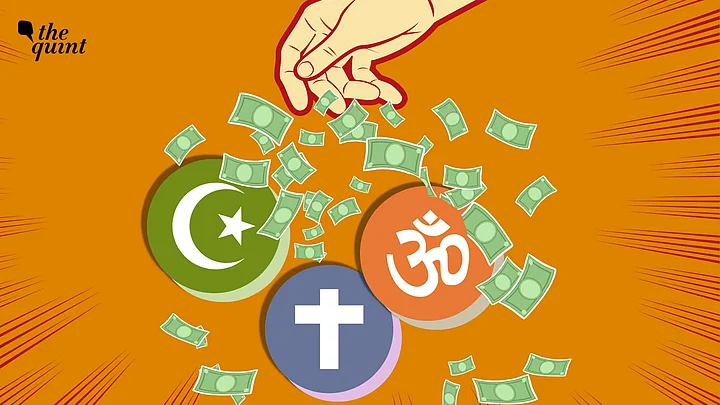The year 2021-22 saw an increase in the market size for household giving to ‘religious organisations’ in India from 70 per cent of the total household giving in 2020-21 to 75 per cent in 2021-22.
But what does ‘giving’ to ‘religious organisations’ mean to Indian households? What are the drivers behind giving to such organisations? Are the donations to ‘religious organisations’ intended exclusively for ‘religious purposes’ or do the motivations traverse religion?
Market Size of Household Donations in India
Recent studies by the Centre for Social Impact and Philanthropy (CSIP) at Ashoka University estimate that the total ‘cash’ donations (made via currency notes, cheques, digital wallets, and credit/debit cards - offline and online) by Indian households have increased from Rs 23.7 thousand crores in 2020–21 to Rs 27 thousand crores in 2021–22, which is about 14 per cent annual increase.
The average ‘cash’ donations by Indian households have also increased from Rs 885 (2020-21) to Rs 925 (2021-22). The biggest beneficiaries of household donations are ‘religious organisations’ (institutions for religious worship including temples, mosques, gurudwaras, and churches) followed by ‘persons engaged in beggary’.
The market size of donations to ‘religious organisations’ went from Rs 16.6 thousand crore in 2020-21 to Rs 20.2 thousand crore in 2021-22. The rise in giving to ‘religious organisations’ is primarily driven by the increase in the proportion of households donating to such organisations (from 64 per cent to 73 per cent in one year).
The significance of giving to ‘religious organisations’ in the country can be observed through the upward trend in household donations across regions, rural-urban landscapes, and socio-economic classes. This pattern intrigues us to delve into deeper questions that revolve around the underlying motivations behind households giving to ‘religious organisations’.
Drivers for Giving to ‘Religious Organisations’: Beyond Religious Intentions
‘Religious beliefs’ stood out as the most important motivation for household giving in India. Interestingly, the study reveals that the motivations to give go beyond ‘religious beliefs’.
These motivations range from ‘religious beliefs’ and ‘religious customs’ such as giving on festivals or at religious places to ‘family traditions’, ‘desire to support someone in distress’ or for ‘seva’ (to do service). 73 per cent of households said that their donations were towards ‘religious organisations’ but their motivations for giving were varied and went beyond ‘religious beliefs’ and sentiments for the households.
There are many more nuances when it comes to understanding the drivers behind giving to ‘religious organisations’. Many households believe that the donations made to ‘religious organisations’ are used for non-religious purposes such as ‘providing food to the hungry’, ‘giving clothing to the poor’, spending on ‘maintenance of infrastructure’, and ‘medical aid to the poor’. The essence behind giving is to do seva or serving others as households connect extending help to someone as a way to serve God and it accounts as good karma (deeds) and the Almighty rewards good deeds.
Personally, we were intrigued to note that while the intention to donate by many households was for non-religious purposes, the preferred recipient group for the majority of households are ‘religious organisations’. The vital aspect that comes to the limelight is ‘trust’. Households perceive that the donations given to ‘religious organisations’ would be used for purposes they would want. Their perception is validated when the majority of households reported to have actually seen the money being used towards the intended purpose such as providing food to the hungry and clothing to the poor.
‘Religious organisations’ also enjoy the benefits of familiarity and longstanding affiliation with the communities. Of the total households that donated to ‘religious organisations’ 84 per cent of them donated to local places of worship. These households are either associated with or have known the local places of worship which bridges the gap between trust and giving. Many households also donate as part of their ‘family traditions’.
Another prominent reason apart from ‘trust’ is the ease or convenience of making small-sized donations as 53 per cent of those who donated to ‘religious organisations’ did so as they could do so even in a small amount.
Interestingly, the ‘religious organisations’ are most proactive in making outreach efforts for donations which in turn contributes to the overall size of the donations ‘religious organisations’ receive. Most outreach efforts are made through direct interaction (face-to-face) by the beneficiary or the recipient of the contribution.
Even though ‘tax benefit’ did not emerge as an important motivator, about 36 per cent of households received a receipt for their donation but only six per cent of households knew they could avail of income tax benefits based on their donation receipts. In other words, one in every fourth household was unaware/unsure that such tax provisions existed.
Giving to ‘religious organisations’ is more than what we think. The trust in the organisation, ease of giving, and the belief that the money given to these organisations goes for a good cause - all contribute to the quantum and the proportion of the size of households donating to ‘religious organisations’.
(Dr Shaivya Verma and Divya Chopra are Senior Research Managers at the Centre for Social Impact and Philanthropy [CSIP], Ashoka University, India. The CSIP is India’s first academic centre based at Ashoka University in India which focuses on enabling strategic and robust philanthropy for greater social impact. This is an opinion article and the views expressed are the author’s own. The Quint neither endorses nor is responsible for them.)
